January 6 committee votes to hold Dan Scavino, Peter Navarro in contempt
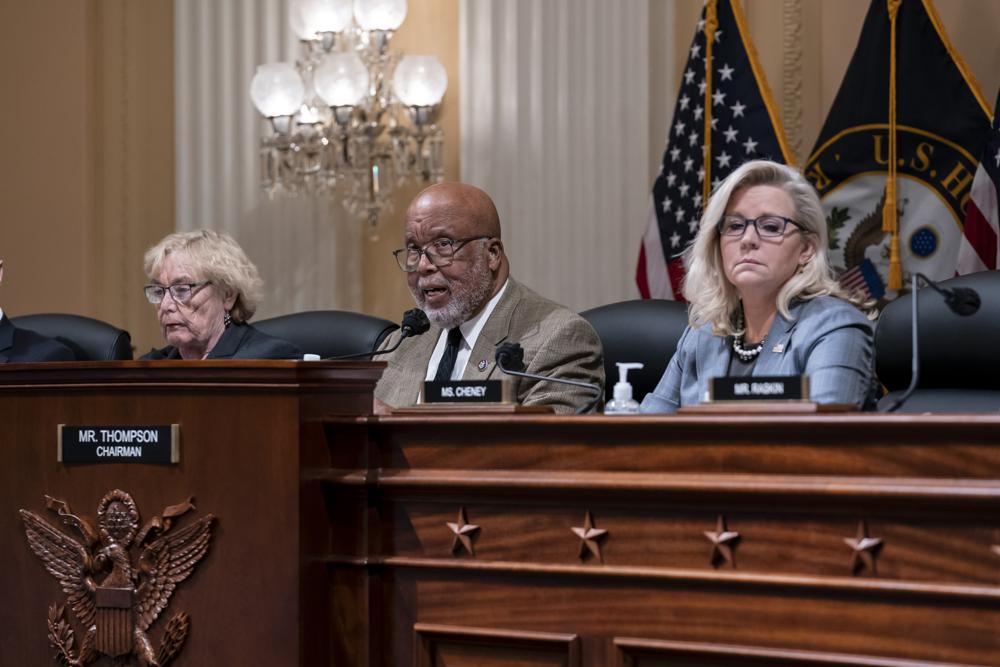
The House committee investigating the January 6 attack on the U.S. Capitol voted unanimously Monday night to hold former Trump advisers Peter Navarro and Dan Scavino in contempt of Congress for their monthslong refusal to comply with subpoenas. The committee made their case that Navarro, former President Donald Trump’s trade adviser, and Scavino, a White House communications aide under Trump, have been uncooperative in the congressional probe into the deadly 2021 insurrection and, as a result, are in contempt. “They’re not fooling anybody. They are obligated to comply with our investigation. They have refused to do so. And that’s a crime,” Mississippi Rep. Bennie Thompson, the committee’s Democratic chairman, said in his opening remarks. The recommendation of criminal charges now goes to the full House, where it is likely to be approved by the Democratic-majority chamber. Approval there would then send the charges to the Justice Department, which has the final say on the prosecution. At Monday’s meeting, lawmakers made yet another appeal to Attorney General Merrick Garland, who has not yet made a decision to pursue the contempt charges the House set forward in December on former White House chief of staff Mark Meadows. “We are upholding our responsibility,” Rep. Adam Schiff, a member of the committee, said in his remarks. “The Department of Justice must do the same.” The committee is investigating the circumstances surrounding January 6, when pro-Trump rioters stormed the Capitol, fueled by his false claims of a stolen election, in hopes of blocking Congress from certifying election results showing Democrat Joe Biden defeated Trump. Ahead of the committee’s vote, the panel scored a big legal victory in its quest for information from Trump lawyer John Eastman when a federal judge in California asserted Monday morning that it is “more likely than not” that Trump committed crimes in his attempt to stop the certification of the 2020 election. With that argument, U.S. District Court Judge David Carter, a Bill Clinton appointee, ordered the release of more than 100 emails from Eastman to the committee. Charles Burnham, an attorney representing Eastman, said in a statement Monday that his client has a responsibility to his attorney-client privilege, and his lawsuit against the committee “seeks to fulfill this responsibility.” Navarro, 72, was subpoenaed for his testimony in early February. The panel wants to question the Trump ally who promoted false claims of voter fraud in the 2020 election that the committee believes contributed to the attack. “He hasn’t been shy about his role in efforts to overturn the results of the 2020 election and has even discussed the former President’s support for those plans,” Thompson, the committee’s Democratic chairman, said in a statement at the time. Though Navarro sought to use executive privilege to avoid cooperation, the Biden administration has denied claims from him, Scavino, and former national security adviser Michael Flynn, saying an assertion of executive privilege was not justified or in the national interest. On Thursday, Navarro called the committee vote “an unprecedented partisan assault on executive privilege,” and said, ”The committee knows full well that President Trump has invoked executive privilege, and it is not my privilege to waive.” In a statement Sunday night, Navarro said the committee “should negotiate this matter with President Trump.” He added, “If he waived the privilege, I will be happy to comply; but I see no effort by the Committee to clarify this matter with President Trump, which is bad faith and bad law.” In a subpoena issued to Scavino last fall, the committee cited reports that he was with Trump the day before the attack during a discussion about how to persuade members of Congress not to certify the election for Biden and with Trump again the day of the attack and may have “materials relevant to his videotaping and tweeting” messages that day. In the recent report, the committee said it also has reason to believe that due to the 46-year-old’s online presence, Scavino may have had advance warning about the potential for violence on January 6. Scavino and his counsel have received at least half a dozen extensions to comply with the subpoena, according to the committee. “Despite all these extensions, to date, Mr. Scavino has not produced a single document, nor has he appeared for testimony,” the report stated. A lawyer for Scavino did not return messages seeking comment. As the committee enforces its subpoena power, it is also continuing to branch out to others in Trump’s orbit. Lawmakers now plan to reach out to Virginia Thomas — known as Ginni — the wife of Supreme Court Justice Clarence Thomas, in regards to her reported text messages with former White House Chief of Staff Mark Meadows on the day of the attack, according to two people familiar with the investigation who were granted anonymity to discuss the panel’s private deliberations. But the panel has not decided what their outreach to Thomas, a conservative activist, will look like and whether that will come in the form of a subpoena or a voluntary request to cooperate. Also, later this week, the committee plans to interview former Trump adviser and son-in-law Jared Kushner, one of the people said. The committee previously voted to recommend contempt charges against longtime Trump ally Steve Bannon after he defied a congressional subpoena, as well as against Meadows after he ceased cooperating with the panel. The full House then approved both contempt referrals. Bannon was later indicted by a federal grand jury and is awaiting prosecution by the Justice Department. The Justice Department has not taken any action against Meadows. The central facts of the January 6 insurrection are known but what the committee is hoping to do is fill in the remaining gaps about the attack on the Capitol, and lawmakers say they are committed to presenting a full accounting to make sure it never happens again. The panel is looking into every aspect of the riot, including what Trump himself was doing while it unfolded and any connections between the White House and the rioters who broke into the Capitol building. Republished with the permission
Donald Trump pardons 15, commutes 5 sentences, including GOP allies
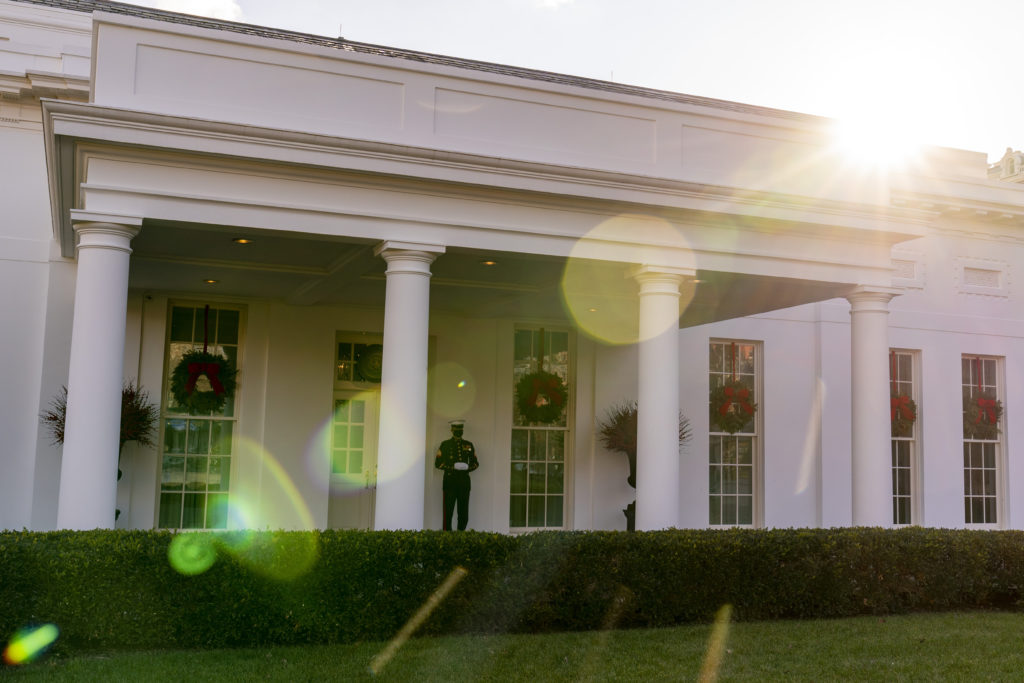
President Donald Trump on Tuesday pardoned 15 people, including a pair of congressional Republicans who were strong and early supporters, a 2016 campaign official ensnared in the Russia probe and former government contractors convicted in a 2007 massacre in Baghdad. Trump’s actions in his final weeks in office show a president who is wielding his executive power to reward loyalists and others who he believes have been wronged by a legal system he sees as biased against him and his allies. Trump issued the pardons — not an unusual act for an outgoing president — even as he refused to publicly acknowledge his election loss to Democrat Joe Biden, who will be sworn in on Jan. 20. Trump is likely to issue more pardons before then. He and his allies have discussed a range of other possibilities, including members of Trump’s family and his personal attorney Rudy Giuliani. Those pardoned on Tuesday included former Republican Reps. Duncan Hunter of California and Chris Collins of New York, two of the earliest GOP lawmakers to back Trump’s 2016 presidential campaign. Trump also commuted the sentences of five other people, including former Rep. Steve Stockman of Texas. Collins, the first member of Congress to endorse Trump to be president, was sentenced to two years and two months in federal prison after admitting he helped his son and others dodge $800,000 in stock market losses when he learned that a drug trial by a small pharmaceutical company had failed. Hunter was sentenced to 11 months in prison after pleading guilty to stealing campaign funds and spending the money on everything from outings with friends to his daughter’s birthday party. White House press secretary Kayleigh McEnany said the pardons for Hunter and Collins were granted after “the request of many members of Congress.” She noted that Hunter served the nation in the U.S. Marines and saw combat in both Iraq and Afghanistan. In the group announced Tuesday night were four former government contractors convicted in a 2007 massacre in Baghdad that left more than a dozen Iraqi civilians dead and caused an international uproar over the use of private security guards in a war zone. Supporters of Nicholas Slatten, Paul Slough, Evan Liberty, and Dustin Heard, the former contractors at Blackwater Worldwide, had lobbied for pardons, arguing that the men had been excessively punished in an investigation and prosecution they said was tainted by problems and withheld exculpatory evidence. All four were serving lengthy prison sentences. The pardons reflected Trump’s apparent willingness to give the benefit of doubt to American service members and contractors when it comes to acts of violence in war zones against civilians. Last November, for instance, he pardoned a former U.S. Army commando who was set to stand trial next year in the killing of a suspected Afghan bomb-maker and a former Army lieutenant convicted of murder for ordering his men to fire upon three Afghans. Trump also announced pardons for two people entangled in special counsel Robert Mueller’s Russia investigation. One was for 2016 campaign adviser George Papadopoulos, who pleaded guilty to lying to the FBI about a conversation in which he learned that Russia had dirt on Trump’s Democratic opponent, Hillary Clinton. The president also pardoned Alex van der Zwaan, a Dutch lawyer who was sentenced to 30 days in prison for lying to investigators during the Mueller probe. Van der Zwaan and Papadopoulos are the third and fourth Russia investigation defendants granted clemency. By pardoning them, Trump once again took aim at Mueller’s inquiry and advanced a broader effort to undo the results of the investigation that yielded criminal charges against a half-dozen associates. The pardons drew criticism from top Democrats. Rep. Adam Schiff, D-Calif., the chairman of the House Permanent Select Committee on Intelligence, said the president was abusing his power. “Trump is doling out pardons, not on the basis of repentance, restitution or the interests of justice, but to reward his friends and political allies, to protect those who lie to cover up him, to shelter those guilty of killing civilians, and to undermine an investigation that uncovered massive wrongdoing,” Schiff said. Last month, Trump pardoned former national security adviser Michael Flynn, who had twice pleaded guilty to lying to the FBI, and months earlier commuted the sentence of another associate, Roger Stone, days before he was to report to prison. Trump has granted about 2% of requested pardons in his single term in office — just 27 before Tuesday’s announcement. By comparison, Barack Obama granted 212 or 6%, and George W. Bush granted about 7%, or 189. George H.W. Bush, another one-term president, granted 10% of requests. Also among those pardoned by Trump was Phil Lyman, a Utah state representative who led an ATV protest through restricted federal lands. Lyman was serving as a Utah county commissioner in 2014 when he led about 50 ATV riders in a canyon home to Native American cliff dwellings that officials closed to motorized traffic. The ride occurred amid a sputtering movement in the West pushing back against federal control of large swaths of land and came in the wake of an armed confrontation Nevada rancher Cliven Bundy had with Bureau of Land Management over grazing fees. Lyman spent 10 days in prison and was ordered to pay nearly $96,000 in restitution. The Trump administration in 2017 lifted a ban on motorized vehicles in parts of the canyon but left restrictions in place through other areas where Lyman led his ride. Two former U.S. Border Patrol agents were also pardoned, Ignacio Ramos and Jose Compean, convicted of shooting and wounding a Mexican drug smuggler near El Paso, Texas, in 2005. Others on the list included a Pittsburgh dentist who pleaded guilty to health care fraud, two women convicted of drug crimes, and Alfred Lee Crum, now 89, who pleaded guilty in 1952 when he was 19 to helping his wife’s uncle illegally distill moonshine. Crum served three years of probation and paid a $250 fine. The White House
Donald Trump says William Barr resigning, will leave before Christmas

Attorney General William Barr, one of President Donald Trump’s staunchest allies, is departing amid lingering tension over the president’s baseless claims of election fraud and the investigation into President-elect Joe Biden’s son. Barr went Monday to the White House, where Trump said the attorney general submitted his letter of resignation. “As per letter, Bill will be leaving just before Christmas to spend the holidays with his family,” Trump tweeted. Trump has publicly expressed his anger about Barr’s statement to The Associated Press earlier this month that the Justice Department had found no widespread fraud that would change the outcome of the election. Trump has also been angry that the Justice Department did not publicly announce it was investigating Hunter Biden ahead of the election, despite department policy against such a pronouncement. Barr told the AP that U.S. attorneys and FBI agents have been working to follow up specific complaints and information they’ve received, but “to date, we have not seen fraud on a scale that could have effected a different outcome in the election.” Barr’s resignation leaves Trump without a critical ally as he winds down his final weeks in office, and it throws into question open Justice Department investigations, especially the probe into Hunter Biden’s taxes. In his resignation letter, Barr said he updated Trump Monday on the department’s “review of voter fraud allegations in the 2020 election and how these allegations will continue to be pursued.” He added that his last day on the job would be Dec. 23. Trump said Deputy Attorney General Jeff Rosen, whom he labeled “an outstanding person,” will become acting attorney general. As the current second in command at the Justice Department, Rosen’s appointment is not likely to change much in the final weeks before the administration departs. Trump spent much of the day watching the Electoral College tally and calling allies but broke away to meet with Barr. His tweet about the Attorney General’s exit was a sober message from a president who is notoriously cold to his departing staff and quick to name-call and deride them once they say they are leaving. Trump has also previously claimed he fired staffers who resigned to make himself appear more powerful, and others, like former attorney general Jeff Sessions, were mocked by the president for weeks before they left office. But despite Trump’s obvious disdain for those who publicly disagree with him, Barr had generally remained in the president’s good graces and has been one of the president’s most ardent allies. Before the election, he had repeatedly raised the notion that mail-in voting could be especially vulnerable to fraud during the coronavirus pandemic as Americans feared going to polls. But Trump has a low tolerance for criticism, especially public criticism, from his allies and often fires back in kind. The two had been at odds in the past few months and Barr was said to have been frustrated by Trump’s tweeting. Trump said on Fox News over the weekend that he was disappointed that the Hunter Biden investigation had not been disclosed. Hunter Biden himself announced it last week. “Bill Barr should have stepped up,” Trump said. One senior administration official not authorized to speak publicly and speaking to The AP on condition of anonymity said Barr had resigned of his own accord and described the meeting as amicable. Barr, who was serving in his second stint as attorney general, sought to paint himself as an independent leader who would not bow to political pressure. But Democrats have repeatedly accused Barr of acting more like the president’s personal attorney than the attorney general, and Barr had proved to be a largely reliable Trump ally and defender of presidential power. Sen. Lindsey Graham, the Republican leader of the judiciary committee, told reporters at the Capitol he was surprised by the news. “I think he did an incredibly good job trying to repair damage done to the Department of Justice, trying to be fair and faithful to the law. I think he’s got a lot to be proud of,” Graham said. “He fought for the president where he could, as every attorney general and administration should, but he also didn’t cross lines that he shouldn’t have crossed.” He said he was referring to disclosing the Biden investigation. Before releasing special counsel Robert Mueller’s full report on the Russia investigation last year, Barr framed the results in a manner favorable to Trump even though Mueller pointedly said he couldn’t exonerate the president of obstruction of justice. He also appointed as special counsel the U.S. attorney who is conducting a criminal investigation into the origins of the FBI’s probe of the 2016 election that morphed into Mueller’s investigation of possible Trump-Russia cooperation, following Trump’s repeated calls to “investigate the investigators.” Barr also ordered Justice Department prosecutors to review the handling of the federal investigation into Trump’s former national security adviser Michael Flynn and then sought to dismiss the criminal charges against Flynn, who had twice pleaded guilty to lying to the FBI. Trump later pardoned Flynn. Barr’s break from Trump over election fraud wasn’t the first. Earlier this year, Barr told ABC News that the president’s tweets about Justice Department cases “make it impossible for me to do my job,” and tensions flared just a few months ago when the two were increasingly at odds over the pace of the Durham investigation. Trump had been increasingly critical about a lack of arrests and Barr was privately telling people he was frustrated by Trump’s public pronouncements about the case. Trump was also said to blame Barr for comments from FBI Director Chris Wray on election fraud and mail-in voting that didn’t jibe with the president’s alarmist rhetoric. Republished with the permission of the Associated Press.
Ex-Donald Trump adviser Steve Bannon charged in border wall scheme

The arrests make Bannon the latest addition to a startlingly long list of Trump associates who have been prosecuted.
Ex-judge says push to dismiss Michael Flynn case is abuse of power
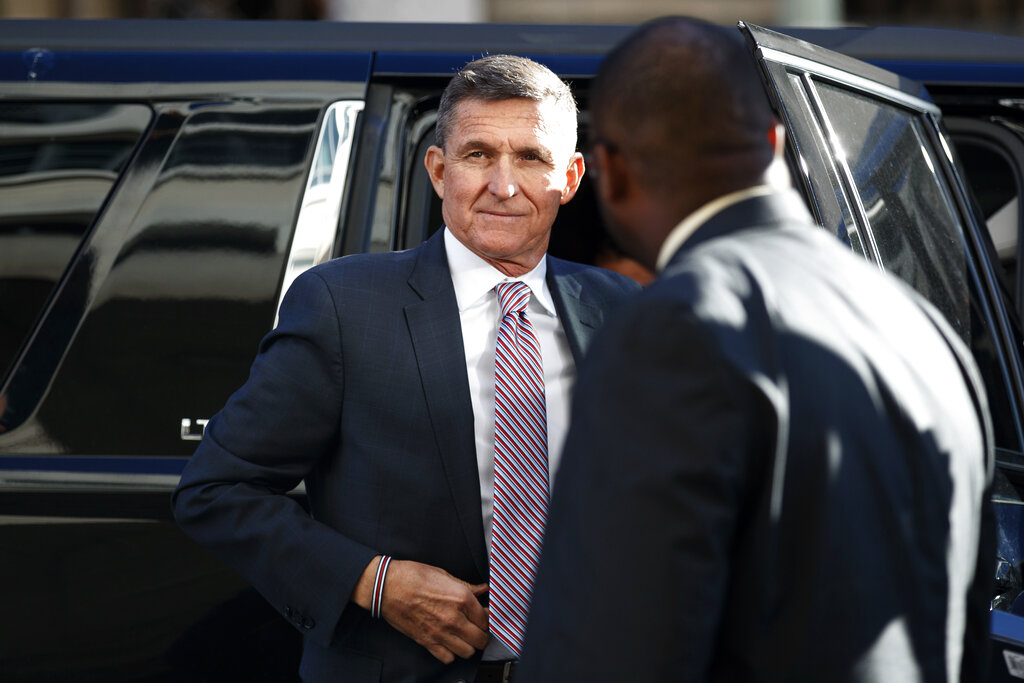
The ex-judge said that the government “has engaged in highly irregular conduct to benefit a political ally of the President.”
Donald Trump, GOP launch broad attack on Russia probe foundations

Trump and his Republican allies are pushing to reframe the Russia investigation as a “deep state” plot to sabotage his administration.
With impeachment over, critics see Donald Trump ‘retribution tour’
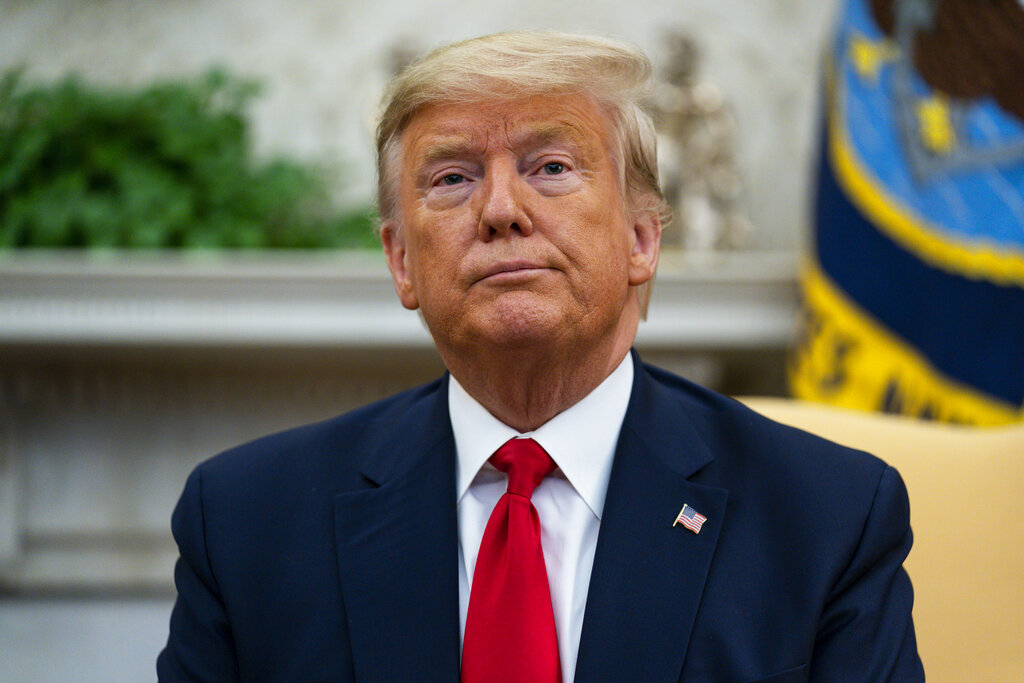
Trump has told confidants in recent days that he felt both vindicated and strengthened by his acquittal in the Senate.
Trial team quits Roger Stone case in dispute over sentence

The departures of the entire trial team broke open a simmering dispute over the punishment of Roger Stone.
House committee subpeoneas Michael Flynn, Rick Gates in Russia probe
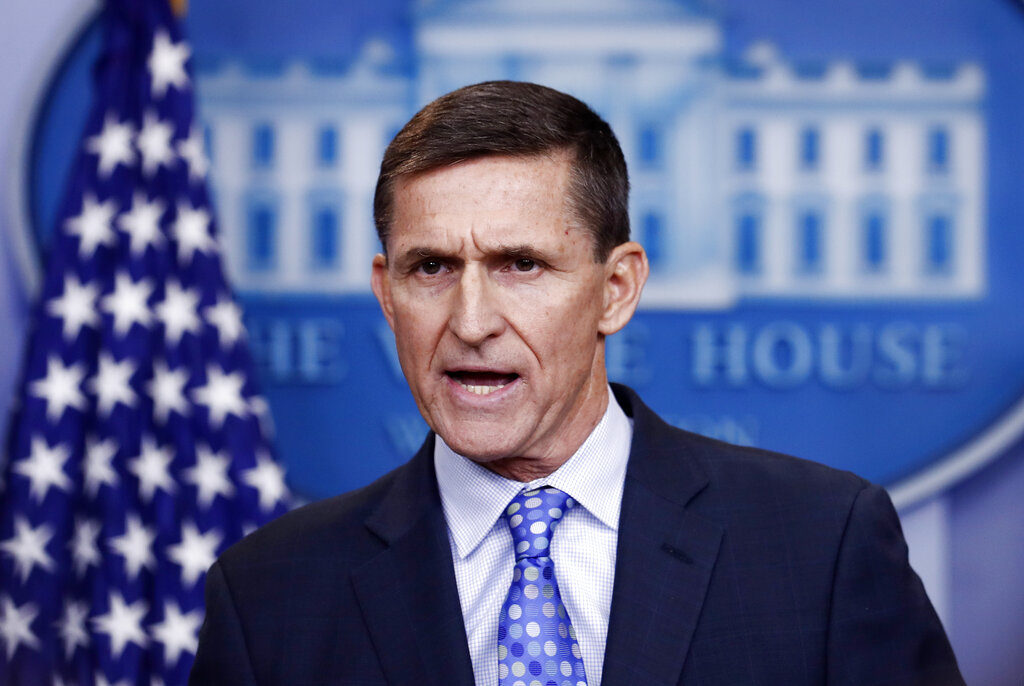
The House Intelligence Committee has subpoenaed former White House national security adviser Michael Flynn and former Trump campaign aide Rick Gates as part of its investigation into Russian interference in the 2016 U.S. presidential election. Committee Chairman Adam Schiff said Thursday the committee is examining “deep counterintelligence concerns” raised in special counsel Robert Mueller’s report and “requires speaking directly” with Flynn and Gates, who were important witnesses for Mueller’s investigation. “The American people, and the Congress, deserve to hear directly from these two critical witnesses,” the California Democrat said in a statement. “We hope these witnesses come to recognize their cooperation as being with the United States, not merely the Department of Justice.” The subpoena seeks documents and testimony from both men. Letters sent to their lawyers request that records be produced by June 26 and that they testify before the committee on July 10. Flynn admitted lying to the FBI about his conversations with the Russian ambassador to the United States and awaits sentencing. He was supposed to have been sentenced last December, but midway through the hearing abruptly asked for it to be postponed so that he could continue cooperating with the Justice Department and earn additional credit toward a reduced sentence. Schiff told reporters Thursday that “there are a whole host of issues that we want the opportunity to discuss.” “We have not had that opportunity over the past couple of years because of their involvement in their own cases and now potentially … in the cases involving others,” he added. Schiff told reporters the committee is interested in Flynn’s discussions with former ambassador Sergey Kislyak about sanctions imposed on Russia as well as his involvement in foreign business deals. Asked if he thought Flynn and Gates would appear, Schiff said, “I would hope that they would consider it valuable as a part of their cooperation, to show the court that they are doing everything that they can to assist the United States government, that they will also assist the Congress.” Flynn’s attorney, Sidney Powell, said in an email to The Associated Press, “The General is continuing to cooperate with the government,” but she declined to comment on the subpoena. Gates’ lawyer did not immediately return an email message about the subpoena. Powell, a former federal prosecutor who has been an outspoken critic of Mueller’s investigation, was recently hired by Flynn after he fired his previous lawyers. The change may herald a shift in Flynn’s legal strategy in the final stages of his case. Gates pleaded guilty to conspiracy and false statement charges related to Ukrainian lobbying and political consulting he did with ex-Trump campaign chairman Paul Manafort, who’s been sentenced to more than seven years in prison. Associated Press writer Susannah George contributed to this report. Republished with the permission of the Associated Press.
Ex-FBI official: ‘Crime may have been committed’ by Donald Trump
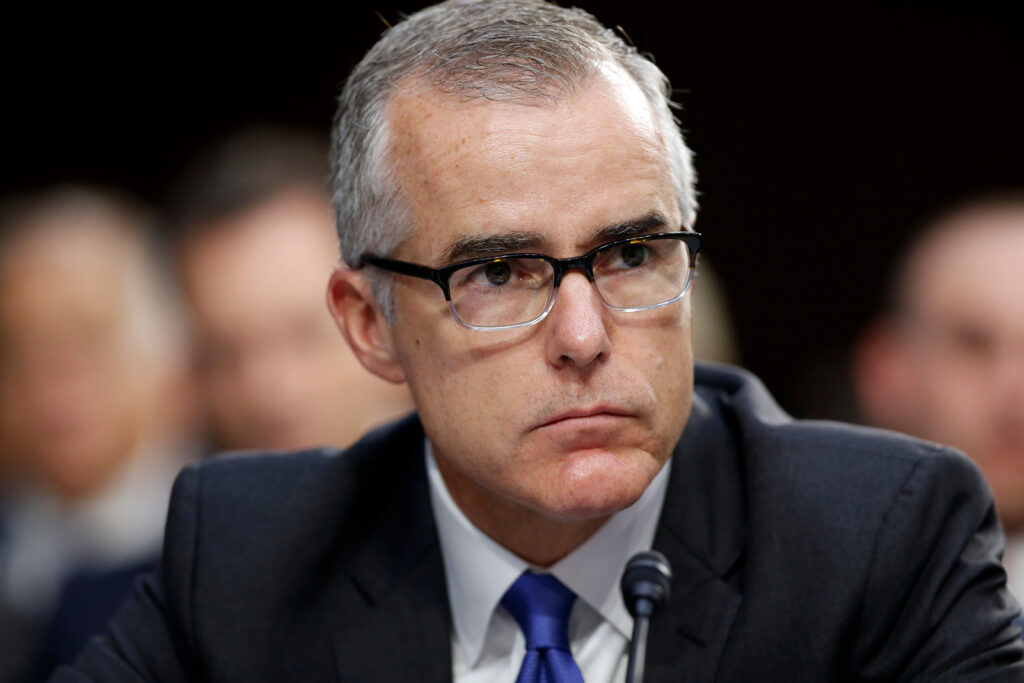
Former FBI Deputy Director Andrew McCabe said in an interview that aired Sunday that a “crime may have been committed” when President Donald Trump fired the head of the FBI and tried to publicly undermine an investigation into his campaign’s ties to Russia. McCabe also said in the interview with “60 Minutes” that the FBI had good reason to open a counterintelligence investigation into whether Trump was in league with Russia, and therefore a possible national security threat, following the May 2017 firing of then-FBI Director James Comey. “And the idea is, if the president committed obstruction of justice, fired the director of the of the FBI to negatively impact or to shut down our investigation of Russia’s malign activity and possibly in support of his campaign, as a counterintelligence investigator you have to ask yourself, “Why would a president of the United States do that?” McCabe said. He added: “So all those same sorts of facts cause us to wonder is there an inappropriate relationship, a connection between this president and our most fearsome enemy, the government of Russia?” Asked whether Deputy Attorney General Rod Rosenstein was onboard with the obstruction and counterintelligence investigations, McCabe replied, “Absolutely.” A Justice Department spokeswoman declined to comment Sunday night. McCabe also revealed that when Trump told Rosenstein to put in writing his concerns with Comey — a document the White House initially held up as justification for his firing — the president explicitly asked the Justice Department official to reference Russia in the memo. Rosenstein did not want to, McCabe said, and the memo that was made public upon Comey’s dismissal did not mention Russia and focused instead on Comey’s handling of the Hillary Clinton email server investigation. “He explained to the president that he did not need Russia in his memo,” McCabe said. “And the president responded, “I understand that, I am asking you to put Russia in the memo anyway.” Trump said in a TV interview days after Comey’s firing that he was thinking of “this Russia thing” when he fired Comey. Those actions, including a separate request by Trump that the FBI end an investigation into his first national adviser, Michael Flynn, made the FBI concerned that the president was illegally trying to obstruct the Russia probe. “Put together, these circumstances were articulable facts that indicated that a crime may have been committed,” McCabe said. “The president may have been engaged in obstruction of justice in the firing of Jim Comey.” McCabe was fired from the Justice Department last year after being accused of misleading investigators during an internal probe into a news media disclosure. The allegation was referred to the U.S. Attorney’s office in Washington for possible prosecution, but no charges have been brought. McCabe has denied having intentionally lied and said Sunday that he believes his firing was politically motivated. “I believe I was fired because I opened a case against the president of the United States,” he said. In the interview Sunday, McCabe also said Rosenstein in the days after Comey’s firing had proposed wearing a wire to secretly record the president. McCabe said he took the remark seriously, though the Justice Department last September — responding last September to a New York Times report that first revealed the conversation — issued a statement from an unnamed official who was in the room and interpreted the remark as sarcastic. McCabe said the remark was made during a conversation about why Trump had fired Comey. “And in the context of that conversation, the deputy attorney general offered to wear a wire into the White House. He said, “‘I never get searched when I go into the White House. I could easily wear a recording device. They wouldn’t know it was there,’” McCabe said. In excerpts released last week by CBS News, McCabe also described a conversation in which Rosenstein had broached the idea of invoking the Constitution’s 25th Amendment to remove Trump from office. The Justice Department said in a statement that Rosenstein, based on his dealings with Trump, does not see cause to seek the removal of the president. Sen. Elizabeth Warren, a Massachusetts Democrat who is seeking her party’s nomination for president, told reporters after a campaign event Sunday in Las Vegas that if the people around Trump believe he cannot fulfill the obligations of his office, then they have a duty to invoke the 25th Amendment. A favorite target of Trump’s ire, Warren said she has no special knowledge on whether there are grounds to remove Trump from office but said that “there are a whole lot of people who do see him every day who evidently were talking about invoking the 25th Amendment.” Republished with permission from the Associated Press.
DOJ lifts secrecy on foreign lobbying opinions
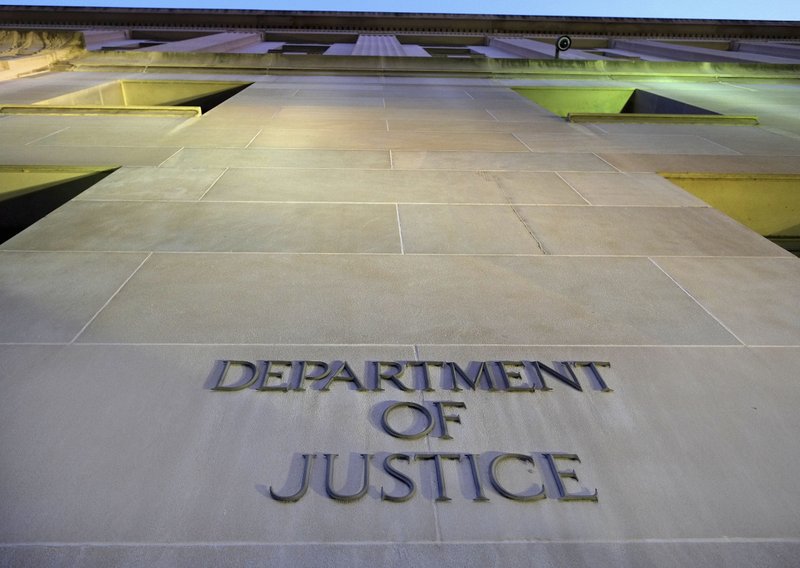
The Justice Department is opening up about the advice it has given to lobbyists who work for foreign governments and political interests. For the first time, the public will be able to read advisory opinions the department has issued to lobbyists, public relations professionals and others about whether they need to register under the Foreign Agents Registration Act, or FARA. The department had kept the opinions secret for decades, a point of contention for transparency advocates and lawyers who specialize in advising clients on complying with the law. The opinions provide an unprecedented view into the thinking of a specialized Justice Department unit whose influence has grown in recent years, propelled by more aggressive enforcement and a special counsel investigation focused on foreign influence operations inside the U.S. The Associated Press obtained copies of dozens of opinions, which were to be posted online later Friday. Those who have requested the department’s guidance include a television host who worked for a company with foreign connections, people negotiating with other governments over the release of prisoners and a firm that planned a U.S. fundraiser for a politician in another country. The department removed the names and other identifying details from the opinions to allow for their public release. In disclosing the opinions, Justice Department officials say they want the public to better understand how they interpret a decades-old law meant to allow Americans to know when foreign entities are trying to influence public opinion or policymakers. The law, enacted in 1938 to unmask Nazi propaganda in the United States, requires people to disclose to the Justice Department when they advocate, lobby or perform public relations work in the U.S. on behalf of a foreign government or political entity. “Today is the law’s 80th anniversary, and it remains a vital tool to combat this threat,” Assistant Attorney General John Demers, the department’s top national security official, said in a statement. “To enhance compliance, we are making these advisory opinions available publicly and online for the first time. By posting these advisory opinions, the Department of Justice is making clearer how we interpret some of FARA’s key provisions.” The heightened enforcement and some high-profile registrations have coincided with special counsel Robert Mueller’s Russia investigation. In the last two years alone, President Donald Trump’s former campaign chairman, Paul Manafort, and former White House national security adviser Michael Flynn have had to register under the law, as has Tony Podesta, a top Democratic lobbyist and brother of Hillary Clinton’s campaign chairman. Manafort is set to go to trial later this year on charges that he concealed his lobbying and influence work on behalf of Ukrainian interests, including a pro-Russian political party. The Justice Department also required the U.S.-based operations of RT, an international television network funded by the Russian government, to register as a foreign agent, a move that angered Russian leaders late last year. U.S. intelligence agencies have alleged RT functioned as a propaganda outlet for the Kremlin as part of an effort to interfere in the 2016 U.S. presidential election. The opinions obtained by the AP show the wide array of requests the Justice Department receives from people and companies trying to determine if they’re obligated to register. In August 2015, for instance, the department determined that a U.S. firm would have to register as a foreign agent if it wanted to host a fundraiser for a candidate running for president in another country. Last February, though, lawyers told a consultant for a foreign government that registration was unnecessary because the work was being done almost entirely outside the United States. That same month, a U.S. organization coordinating with foreign governments in the release of prisoners abroad was told it wouldn’t need to register because the work was humanitarian in nature and not funded by foreign money. Republished with the permission of the Associated Press.
Where did Donald Trump’s claim of an FBI mole come from?

President Donald Trump and his supporters are circulating an explosive theory: The FBI, they say, may have planted a mole, or “spy,” inside the 2016 campaign to bring him down. The unverified allegation has lit up conservative media and earned space on Trump’s Twitter feed just as special counsel Robert Mueller enters his second year in the Russia probe. But where did the allegation come from? The AP takes a look at what we know so far and how Trump has used similar claims in the past to try to discredit the Russia investigation. The ‘Wiretap’ Trump and his supporters have long floated the idea of an opposing “deep state” at the Justice Department and the FBI, including allegations that President Barack Obama ordered wiretaps on his phones during the election. The Justice Department denied such a wiretap, and House intelligence committee Chairman Devin Nunes, an ardent Trump supporter, later confirmed that an Obama-ordered wiretap never existed. But like many conspiracy theories, it appeared to grow out of a less sensational truth: U.S. surveillance on foreign officials — a common practice in the world of spycraft — likely picked up what’s called “incidental” communications with Americans in Trump’s orbit. That included former national security adviser Michael Flynn’s discussions with Russia’s ambassador to the U.S. during the presidential transition. The Mole At issue now isn’t a wiretap, but the identity of a top-secret FBI informant who allegedly helped investigators on the Russia probe. Trump and his lawyer, Rudy Giuliani, say they suspect the FBI planted someone inside the campaign as a setup. “Reports are there was indeed at least one FBI representative implanted, for political purposes, into my campaign for president,” Trump tweeted early Friday. “It took place very early on, and long before the phony Russia Hoax became a ‘hot’ Fake News story. If true – all time biggest political scandal!” This claim actually isn’t new for Trump supporters either. But it seemed to find new life after news reports confirmed the existence of a confidential source in the Russia investigation. The conservative National Review suggested the puzzle pieces all point toward a mole, attracting Trump’s attention. “If so, this is bigger than Watergate!” Trump tweeted. What We Know Last August, Glenn Simpson of Fusion GPS, who compiled opposition research on Trump, told a Senate panel that former British spy Christopher Steele relied on an “internal Trump campaign source” to compile his now-famous Trump dossier. A person familiar with Simpson’s testimony told the AP at the time that he did not mean to suggest the FBI had a direct source of information from within the Trump campaign. Then last week, The Washington Post reported on the existence of a U.S. citizen who had provided intelligence to the CIA and FBI in the Russia probe. The source had become of particular interest to Nunes, whose committee was quick to dismiss any allegations of collusion between Trump associates and Russia. According to the Post, the Justice Department clashed with Nunes and refused his request for specific details on the person. On Wednesday, The New York Times seemed to lend credence to the idea by reporting that “at least one government informant” met several times with former Trump campaign advisers George Papadopoulos and Carter Page. On Friday, the Times expanded its description, saying the informant is an American academic who teaches in Britain and was sent by the FBI to talk to Papadopoulos and Page because they were suspected of having “suspicious contacts” linked to Russia. What We Don’t Know A person who provides information to investigators wasn’t necessarily planted by authorities. The person could have been someone already working with Trump’s campaign before they agreed to provide information. Or it could be someone who wasn’t affiliated with the campaign and just interacted with people around it. The FBI and Mueller have been extraordinarily tight-lipped about the investigation, providing few public clues to what sources they are relying on or where the probe is headed. Trump and his lawyer, Giuliani, acknowledge they don’t have the answers either. But that hasn’t stopped them from floating the mole theory as a way of undercutting Mueller’s work as an attempt by liberals to bring down the president. Giuliani said in a Friday interview on CNN’s “New Day” that he doesn’t know for sure what happened — and the president doesn’t either. But “for a long time, we’ve been told that there’s been some kind of infiltration,” he said. Republished with the permission of the Associated Press.


